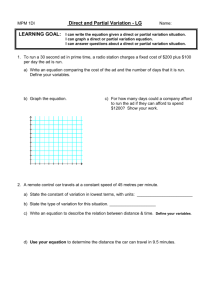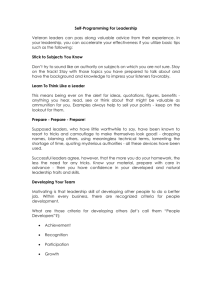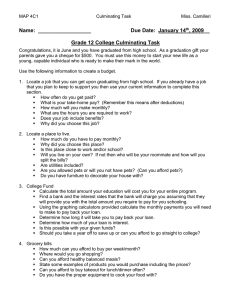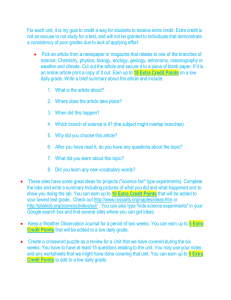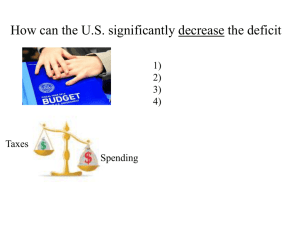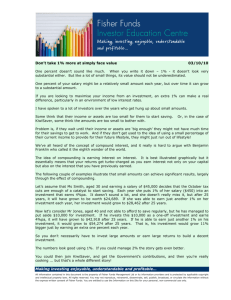Effects of Class - Hackettstown School District
advertisement
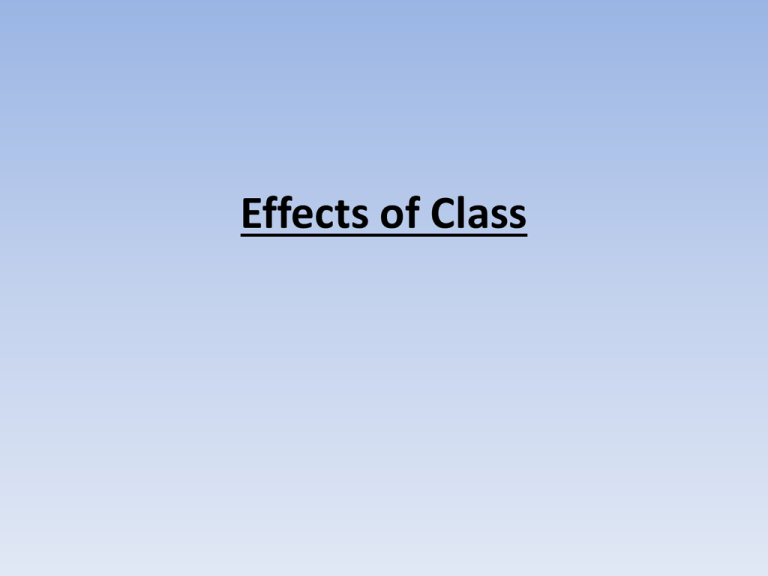
Effects of Class Physical health • Lower class = lower life expectancy • Public clinics vs. expensive treatments • Lifestyle differences Physical Health, continued – If you want to get a full sense of how social class affects health, take a ride on Washington’s Metro system. Staring in the blighted Southeast section of downtown D.C. For every mile you travel to where the wealthy live in Montgomery County, life expectancy rises about a year and a half. By the time you get off, you will find a twenty year gap between the poor blacks where you started your trip and the rich whites where you ended it. – (Cohen 2004) – The lower someone’s class, the earlier they are likely to die before the expected age. – social class opens and closes doors to health care • need to use public clinics, cannot afford treatments or hospital visits – lifestyle differences—more likely to smoke, eat fat, abuse drugs/alcohol, little exercise, practice unsafe sex • With such big problems, its hard to get worked up about little things. Plus, small joys in life, since can’t have the larger joys of success, good living. Mental Health • Poor: more stress = worse mental health – Higher stress in the lower classes, harder to deal with – more likely to be laid off, lower wages, more likely a victim of a crime, have more physical illnesses • What can the rich do to relieve stress? • higher classes can take vacations, afford psychiatrists. Class position gives them greater control over their lives, a key to good mental (and physical)health Poor people can’t do this. But they can do this… OR THIS… Family Life • Poor: higher stress, less money, more marital friction = More divorce and “broken homes” Show: “Social Classes in the Professional World” Choice of husband or wife – capitalists and higher classes may limit “eligible partners” to keep the “family line” – Divorce – much higher rates in the lower classes – higher stress, less money, more marital friction • More children in broken homes • Looking at middle class families • https://www.youtube.com/watch?v=yR_O309A1 BI child rearing practices • Working class – clear authority with children; physical punishment • Middle class – reasoning, concerted cultivation with children; verbal punishment Education: • Richest: elite private schools (bypass public education) • Rich: better public schools or move • Poor: local public school Delbarton –good enough for the Christie kids Show “Trading Schools” • https://www.youtube.com/watch?v=MXBUdw Kk4Fw • (4:57) Trading Schools (NEW) – Oprah – groups of students trade schools - see mental detectors; gym stuff – different/harder curriculum – 2 dozen AP classes vs. 2 • Socialization: • Different curriculum in school – Higher order/creative thinking vs. following orders/prep for regimented tasks – Often less “financial life skills” taught – Keeping checkbook, paying bills, cashing checks, costs of credit cards, etc. – College: • Loans vs. Help with tuition – Public/community vs. expensive/private • Borrowing for college: – assume $30,000 a year that’s $120,000 for 4 years. – Rates are low: 3.25% a year interest rate (usually much higher) – Upon graduating: pay $857 a month for 15 years. (~10284 a year) – Borrowed: $120,000 – total interest payments: $34,243 The Statistics Don’t Lie: Having a college education earns you more money over your lifetime • Information from the U.S. Census Bureau 2008 report reinforces the value of a college education: workers 25 and over with a bachelor’s degree earn an average of $60,954 a year, while those with a high school diploma earn $33,618. Workers with a master's degree make an average of $71,236, and those with a doctoral degree earn an average of $99,995, and a professional degree earns an average of $125,622. Looking at it from a different view, over an adult's working life (45 years), high school graduates can expect, on average, to earn $1.5 million; those with a bachelor's degree, $2.7 million; and people with a master's degree, $3.2 million. Persons with doctoral degrees earn an average of $4.5 million during their working life, while those with professional degrees do best at $5.6 million (http://militaryfinance.umuc.edu/education/index.html) Politics • In general: – higher the social class, more likely Republican. Lower, the more likely Democrats. • Upper – liberal on social issues, conservative on fiscal issues. • Lower – liberal on fiscal issues, conservative on social issues. Crime • More lower class people in prison – Less opportunity – Cannot afford good lawyers Review: (Without notes) In groups make T-chart – benefits of being rich and costs of being poor Being Rich vs. Being Poor – Benefits of being rich • Have an education (and access to better ones – better schools) • Have connections/friends • (all of the above) – Costs of being poor • Couldn’t afford college or better education – stuck with what they’ve got • Need to borrow money (when buying cars, etc.); reliant upon credit, get deeper in debt • Can’t move easily (don’t have a vehicle or money to pay a moving truck) • Don’t have extra money (car breaks down or get a ticket, they are in trouble) • Don’t have a car (can’t easily get to work or to better malls or to Sam’s club or Walmart and cheaper food) • Can’t afford vacations (and no car – means no cheap ones) • Lousy Christmas – difficulty with buying gifts, going out (things you don’t think about – “oh everyone is throwing in $10 to get Betty a wedding shower gift) • Time: Wait at the Laundromat, wait to take bus, etc. • Payday services, check cashing, – or penalties on bank overdrafts or credit card bills • Pay high rent in bad neighborhood (can’t afford to move or to buy a house) • Low education – lower skills, lower wages
